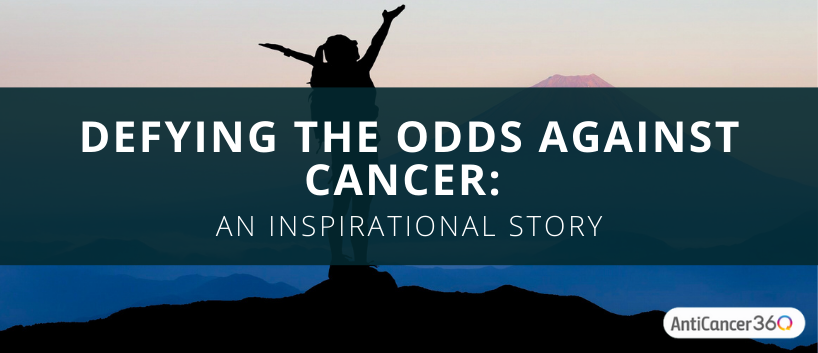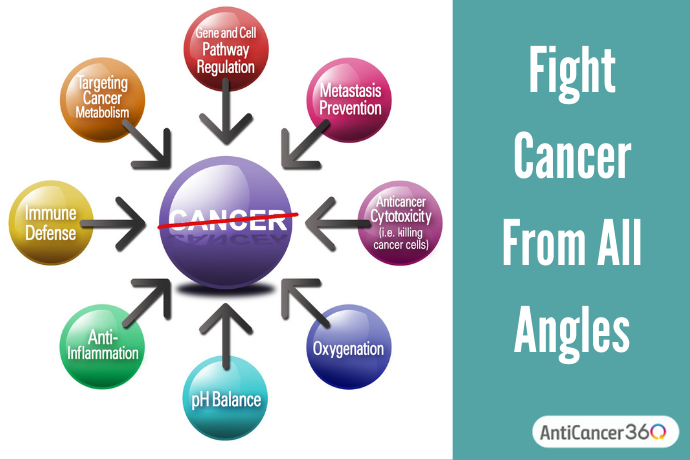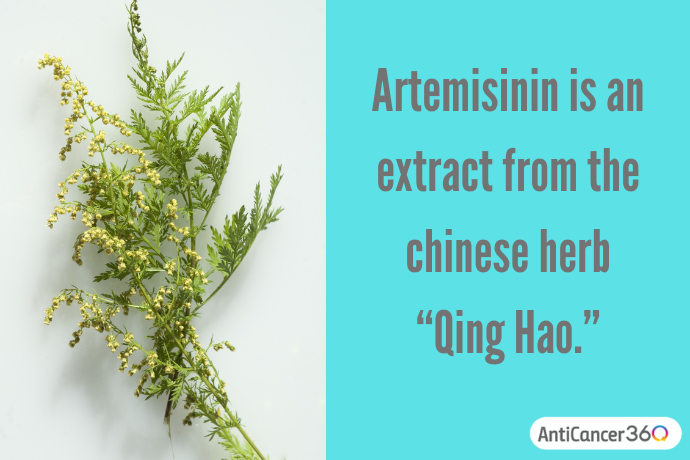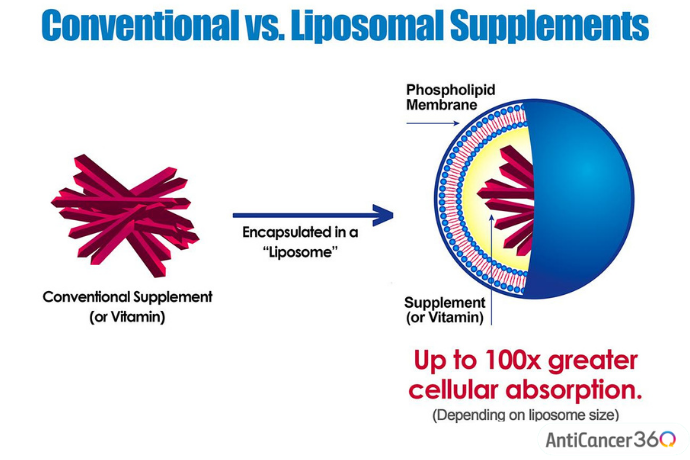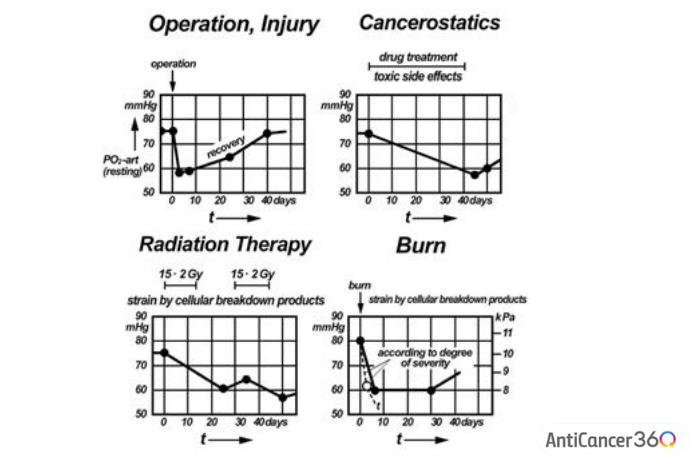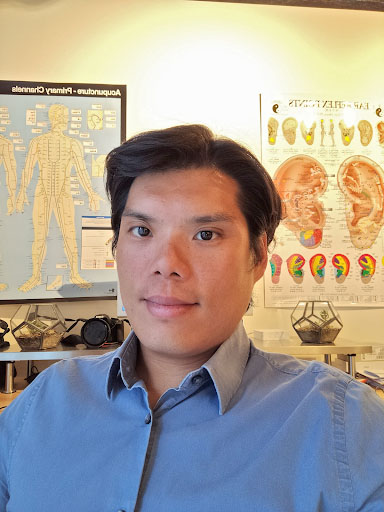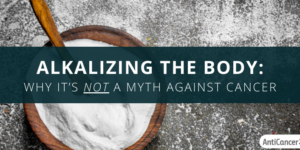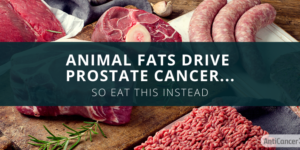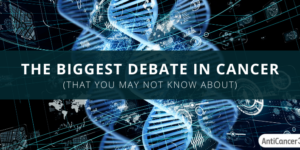In today’s post, we’re going to talk about a person that I’ve been working with. I wanted to write about this particular case, because it shows you some of the obstacles that you may encounter on your journey to health.
One of the reasons why I wanted to write about this case, was the attitude of the oncologist that this person was working with. In this case, she was very skeptical about the “integrative aspects” of the program that this person wanted to include.
She basically wrote them off as “unnecessary” because he was at the “end of his life” anyways.
Well… as you will see, these integrative anticancer techniques may have been the critical factor in his overall program.
Sometimes we just need a little inspiration… and to know, that we CAN defy the odds. This is especially important if your oncology team isn’t giving you much hope. So this is what we’re going to talk about today.
Normal Statistics Are For Normal Situations
As doctors and health practitioners, it’s of course important to be honest with our patients… So in this sense, I don’t blame doctors for putting an “expiration date” on someone’s life when it comes to cancer. These are often backed by clinical experience and statistics.
HOWEVER, I do think it’s a problem to do this when someone doesn’t fit the mold of being a “typical case.” And this is what we’re going to talk about today.
About four months ago, I started working with a person fighting Stage 4 stomach cancer (gastric adenocarcinoma). When they discovered the cancer, his doctors also found that it had already spread to his lungs, liver, and thyroid.
To give you an idea of this person’s condition…
- He couldn’t eat solid foods because the tumor was blocking his digestive system.
- His liver was physically swollen, and causing him pain.
- He had elevated liver enzymes.
- He was losing weight.
So as you can imagine, this person was in a pretty tough situation.
Both his oncologist and his GI doctor agreed that he’d only have about a month to live.
And if they were to start with chemotherapy, that he may get another month or two.
But they were also clear that the chemotherapy “may not be worth it” as it would just prolong the suffering and lower his quality of life. So in this case, the chemotherapy would only be “palliative.”
Now… I can understand their perspective. This person was in bad shape. Under normal circumstances, it’s pretty clear that the disease would take over pretty quickly. And of course, it’s always good if you can enjoy the remaining time that you have.
But here’s what’s important to understand… Not all situations are the same, and you don’t have to be part of the “normal statistics.”
Confronting The Cancer Head On With Your Team
So this person decided to proceed with the treatment. He, with the help of his daughter and family, assembled an “integrative health team,” which is something that I always recommend.
On one hand, the oncologist was doing her treatment with chemotherapy. On the other side, we designed a diet and supplement program to help his body fight the cancer as much as possible (more about this later.)
They also started working with a physical therapist and an (MD) acupuncturist to help with his pain. The acupuncture physician also recommend some nutritional supplementation.
In my opinion, assembling a team like this is really the best thing you can do.
Because if you’re only doing conventional therapies, there are MANY things that are overlooked during treatment. These are the topics that I often discuss throughout my blog.
But… I’ve also had people come to me after some “top alternative cancer treatments” failed to help their case.
So ultimately, when you have an interdisciplinary team to work with, you know that you have all the different options available to you. This way you can choose the best path for your situation.
It’s Important To Do A Multi-Angled Approach
I always emphasize a “multi-angled approach” against cancer. This allows you to target the cancer in many different ways, in addition to your oncologist’s treatments.
So here’s what the person’s overall treatment involved…
The oncologist started with chemotherapy once a week.
Note: And as many of you may know, his oncologist’s treatment is technically and legally the only “cancer treatment” that he received. Everything else that we will talk about are “adjunct techniques” to help support the health of his body overall, and help it fight the cancer more effectively. Even when a certain technique or natural substance has shown potential for anti-cancer effects in research… it’s still an “unproven” adjunct techniques (i.e. not a treatment, or cure for cancer.)
But beyond chemotherapy, they incorporated a variety of other strategies like dietary therapy, supplements, acupuncture, and physical therapy.
Dietary Therapy
So first they started him on an anti-cancer diet. In this case, we decided to start with diet similar to the Budwig Diet. They incorporated the most of fundamental elements of this diet, including the cottage cheese and flax oil mixture (i.e. rapidly absorbable Omega 3, and undamaged Omega 6 fatty acids.)
They also started juicing a variety of fruits and vegetables whenever possible.
All of the added sugar and industrially produced foods in his diet were removed from his diet. He also stopped eating meat.
Note: I think eating meat can often be ok depending on the situation, especially in the context of a ketogenic diet. But in this person’s case, they chose to stop eating meat during this time.
Regardless of what type of diet you choose, it’s important to know why these dietary therapies could potentially help. In this type of diet that he chose, the main anticancer aspects include:
- Removing junk foods overall (i.e. refined sugar, refined carbohydrates, etc…)
- Decreasing cancer promoting inflammation.
- The exchange of fats in this cell and mitochondrial membranes. This helps to normalize and support cell respiration.
- Methionine restriction.
- Increase of anti cancer, and gene regulating phytonutrients.
Though he chose a plant predominant anticancer diet, other diets could also be helpful but through different mechanisms. A ketogenic diet for example is another option. In that case, the diet would more so rely on glucose restriction rather than methionine restriction for it’s potential anti-cancer effects.
An Alkaline Ketogenic Diet is another option that could give you the benefits of both a plant based diet and a ketogenic diet.
Supplementing The Body
So beyond diet, we guided him on choosing supplements to fit his budget and situation. And when choosing supplements in general, it’s important to “cover all of your bases.” This is one of the most important aspects of supplementation.
The last thing that you want to do for example, it to “triple up” on immune supporting supplements, and overlook all of the other ways in which you can help your body fight cancer.
So here are the aspects of his health that we supported, and the supplements we chose to do this…
Immune System: Your immune system has cells that can actually attack cancer cells when given the right conditions. Because of this, it’s important to support your immune system so that it can help to you fight the cancer directly. It’s especially important to protect your immune health from the side effects of conventional cancer treatments.
There are a variety of supplements that can be used… but in his case we recommended Beta 1,3 Glucan (specifically the Transfer Point brand.) This is one of the most well studied substances for immune system support. And when researchers tested a variety of brands, Transfer Point was one of the best. Some of the other brands didn’t even have any effect [1].
This is why we recommend this brand specifically. With supplements in general, sometimes it’s not as big of a deal to go with a reputable non-specific brand. But in some cases, there are specific brands, types, and/or formulations of supplements that you should get for optimal support.
Here’s a video showing an immune cell killing a cancer cell. It’s important to know that these processes can and do happen in the body under the right conditions.
Anti-Metastasis Support: The most dangerous aspect of cancer is metastasis [2]. In fact, metastasis may be ultimately responsible for more than 90% of cancer related deaths [3]. So you want to do everything you can to prevent the cancer from spreading (or spreading more.) In this case, we used a Fractionated Pectin supplement.
Fractionated Pectin has shown potential to help block a protein that’s involved in metastasis (galectin-3) [4]. It has also shown to potential increase the effects of certain chemotherapies [5][6]. Lastly, because it’s a fiber that’s good at soaking things up, it also supports detoxification.
Liver Support and Protection: Your liver is one of the most important organs for your overall health. It can also gets highly stressed during cancer treatment. So to help maintain his liver function, we included “phytosome” formulation of the plant compound “silymarin” which is the active ingredient in milk thistle. This has shown to have liver protective effects [7].
Last but definitely not least…
Adjunctive Cytotoxic Support: “Cyto” means cell… and we all know what toxic means. So adjunctive cytotoxic support means to help kill cancer cells in addition to the oncologist’s treatment. In this case we included two different types of “artemisinin” which is an extract from the chinese herb “Qing Hao.”
Artemisinin was originally used for malaria. But researchers also found that it had cancer killing effects [8][9]. Some “artemisinin derivatives” may even to be stronger than some popular chemotherapy drugs [10][11].
In this person’s case, we used two different types of Artemisinin. One was a standard extract of Artemisinin. The other was a “Nano-Liposomal” form of Artemisinin. This type of formulation basically encapsulates the artemisinin extract in “liposomes” which help it absorb into the body and cell at the level of IV (intravenous delivery), if not even better.
Normally we only use the liposomal formulation because of it’s increased absorption. Studies have shown that the absorption of standard artemisinin extract greatly decreases after a few days [12][13]. So the liposomal from of artemisinin can help to overcome this.
But the reason we used BOTH, is because he has cancer in the digestive tract itself. We don’t have specific data on how well this liposomal formula accumulates in certain tissues. And because the standard form physically passes through the digestive tract, I like to include it in these types of cases just to be safe.
Now just clarify, it’s important to know two things…
First, we’re talking about artemisinin as an adjunctive technique… not a “cancer treatment.” Overall, we don’t have “conclusive evidence” about the anti-cancer effects of Artemisinin.
But this isn’t so critical in an integrative approach because we are not forgoing, or interfering with standard treatments. So the use of Artemisinin is warranted because we do have evidence that it could potentially help against cancer.
Second, Artemisinin isn’t completely without side effects. It can stress the liver in some cases (i.e. cause elevated liver enzymes). And though it’s rare, some people can have an adverse reaction to Artemisinin.
Artemisinin also has the potential to cause (reversible) nerve damage with prolonged use at high doses. But even at higher doses than we normally use, studies have found artemisinin, and its derivative compounds to be quite safe overall [14][15]. And again, even when nerve damage did occur, it’s known to be reversible.
Important: Artemisinin also shouldn’t be used within 30 days of radiation therapy.
So… these supplements above were the “core supplements” that we recommended for his case.
But beyond these, there were also some others that we included to help with side effects. The family also included some supplements of their own… some of which were recommended by their other practitioners. These included:
- Probiotics: protects and maintains the digestive tract.
- Ginger: has potential anti-cancer effects [16], can help with nausea, and combats inflammation [17].
- Graviola: has anti-cancer effects [18].
- Turmeric: contains curcumin, which has a variety of anti-cancer effects [19], regulates a variety of cancer related genes [20][21][22], combats inflammation [23], and helps against fungal infections [24].
- Pau D’ Arco: helps to fight candida fungus (yeast) [25][26] which is often a concurrent problem in cancer, especially when the immune system is compromised [27].
- Vitamin D3: important for overall immune function, and is important for overall anticancer support [28].
- Acetyl L Carnitine: helps to protect against chemotherapy induced nerve damage (based on the chemotherapy drug he was given) [29][30].
- Melatonin: helps to protect from chemotherapy induced nerve damage [31][32], has potential anticancer effects [33], and supports balance in the body’s biological clock.
- Grajiru (Arrabidaea chica extract): has potential anti cancer and immune supporting properties [34].
So as you can see, his program included MANY different supplements. And this is often important when trying to heal from cancer optimally. There are just so many aspects of our bodies that we can help support with different plant compounds, vitamins, nutrients, beneficial bacterias, etc…
In many cases, I actually try to recommend supplements based on a “less is more” type of approach. This makes things more practical, since people can get overwhelmed if you recommend too many supplements. Budget can also be a big concern for many people.
But in this person’s case, he and his family actually added more supplements to the recommendations that I gave them. So I would say that their supplement program was pretty comprehensive overall.
Acupuncture and Other Supportive Therapies Can Be Beneficial
Lastly… beyond diet and supplementation, this person also sought acupuncture and physical therapy treatments. While these were mostly to treat his pain, I suspect that it may have also helped in his overall success against the cancer so far.
And this relates to optimizing blood circulation in the body…
The importance of good blood circulation has been overshadowed by things like anticancer diets and supplements.
But I actually think it’s one of the most important… Why is this?
Because…
- Any food, drugs, or supplements you put in your body depends on blood flow to reach the cancer cells within the tumor.
- Oxygen, immune cells, removal of tumor generated acidity, and the removal of dead cancer cells… all of this relies on good blood circulation to happen optimally.
And… because there are so many factors that can cause poor circulation (including the treatments themselves..,) good circulation is something that should be maintained during cancer treatment.
Here’s why acupuncture may help (especially if you can’t exercise regularly..)
- It’s generally known that tumors have poor blood circulation due to poor blood vessel formation.
- But based on studies looking at exercise and cancer, we know that the tumor circulation can improve greatly when overall circulation improves [35]. And in the same sense… lowering overall circulation is likely to decrease tumor blood circulation also.
- Most importantly… one benefits of acupuncture is that it can stimulate blood flow, and improve blood circulation in the body [36][37].
Overall, maintaining good circulation is important because things like chemotherapy, surgery, and radiation can all decrease microcirculation by depleting oxygen [38]. This was shown by German scientist, Manfred Von Ardenne PhD.
On top of these things, even getting sick (i.e. flu, bacteria, etc..) can lower your body’s oxygen and microcirculation. And in this sense, if your overall program is successfully killing cancer cells… this is also likely to stress your body in the same way.
Take a look at this video below. It actually shows you what “poor microcirculation” looks like in your body. (Think about how this affects oxygenation, immune defense, and waste removal.)
https://www.youtube.com/watch?v=iHZuZ9K0BVM
So as you can see, there are many things that can cause poor microcirculation, and oxygenation during cancer treatment. This is why it’s important to maintain it during this process.
Most importantly for this case, when a person can’t exercise due to side effects of treatment, or age… then acupuncture is one of the next best options.
In this person’s case, the acupuncture helped him greatly in terms of pain relief. And though there were many other things involved, maintaining good blood circulation with acupuncture was probably a significant part of the healing effect, in my opinion.
So in this case, I think the acupuncture may have been a significant part of the overall healing process.
Ok… now onto the good stuff.
We Surprised The Oncologist & Defied The Statistics (For Now)
So 4 months later, the family got their first major diagnostic reassessment.
And it was a bittersweet moment…
Based on his CAT scans:
- Lung tumors shrunk … from 24mm down to 15mm in the comparative tumor.
- Stomach tumor and nearby lymphatic metastasis reduced in size overall.
- Liver tumors shrunk… The biggest went from 14cm down to 9cm. Two others went from 45mm to 26mm, and 13mm to 6mm.
- Thyroid tumor shrunk… from 33mm to 24mm.
Remember… both his oncologist and gastroenterologist only gave him 1 month to live… maybe 2-3 months total with chemotherapy.
And here he is 4-5 months later, still alive, tumors shrinking.
And now, his doctors are giving him ANOTHER 6-12 months to live.
So why were these results bittersweet?
Because his oncologist was still insisting that his case isn’t curable.
This is the same oncologist that recommended against any type of integrative approach, because she thought it wouldn’t do anything to help him.
This is the same oncologist that was surprised when his liver functions normalized, and his liver shrunk back down to normal size.
This is the same oncologist that has had to revise her prediction from 3 months survival time at best… to now, 16 months.
You would think she would rethink the situation a bit, and maybe encourage them to keep doing what they are doing.
Make It A Goal To Prove Them Wrong…
Ultimately, only time will tell if this person can make a full recovery. And even in this case, it will be important for him to maintain his body against cancer for the rest of his life to minimize the chance of recurrence.
But the point of this article is this…
Sometimes we may not get the type of encouragement that we’d like. We may even encounter undue pessimism. So in cases like this, when you have evidence that your program is working… it’s important to keep pushing forward with the final goal in mind.
And when a doctor tells you “how long you have left to live…” remember that these tell you what happens in “most cases.”
But in “most cases,” conventional cancer treatments alone, overlook a variety of strategies that could potentially help your case. These are often cases where people are also told, “eat whatever you want to gain more weight.”
But when you aggressively change your diet and lifestyle, and support your body with variety of anticancer strategies… you’re no longer the “typical case.”
So remember… in the face of pessimism, make it your goal to prove them wrong.
Are You A Candidate For Our Program?
If you’d like to learn more about the AntiCancer360 approach and see if we can help you… please watch our free online webinar to learn more about our approach. Then at the end, you’ll be able to schedule a free call with someone from our team so that we can discuss your case in more detail.
Citations:
Gene Wei is a Board Certified Doctor of Oriental Medicine in the state of Florida, and the founder of AntiCancer360. He’s also a graduate of the University of California Los Angeles, and East West College of Natural Medicine.
His practice is focused on integrative and natural anticancer strategies. Over the years, he’s helped many people overcome difficult cancers… including some cases of “terminal cancer” which were able to be reversed with an “Aggressive Integrative Approach.”

